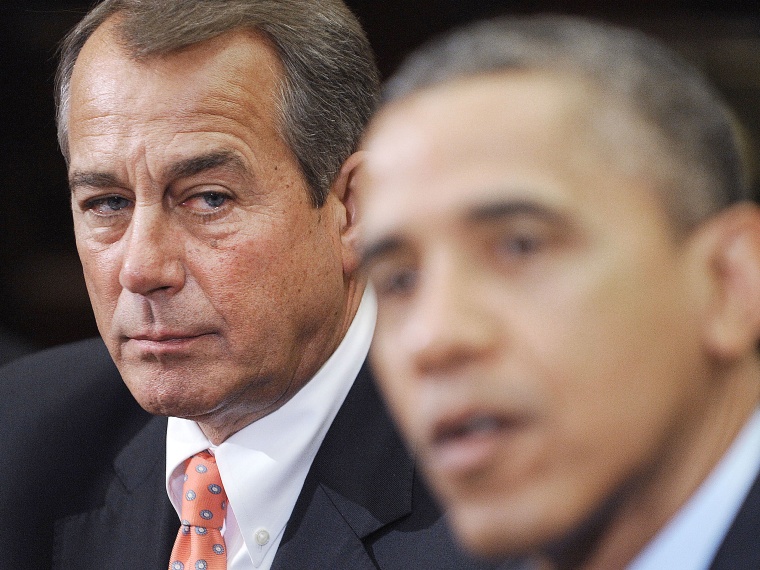There are lots of moving parts to the fiscal cliff, but the tax part—the $400 billion in higher tax payments next year compared to this year—is the most contentious. So if Congress and the administration can resolve that part of the cliff, I’m confident that they can quickly agree on the rest.
And the fight over taxes has boiled down to this: higher rates or a broader base?
It's a sign of progress that Republicans, including Speaker John Boehner and Senate minority leader Mitch McConnell, now recognize that new revenues need to be part of the budget deal (for a long time they argued that we could get there on spending cuts alone—we can’t). Nor are they trying to argue that we can get there through the fairy dust of supply-side growth effects. In other words, Republicans have accepted the need for newly raised tax revenues.
Both parties also agree that what they’re calling the middle class—the 98% of households with incomes below $250,000—should be spared from higher taxes.
But there's still a big sticking point: how to get that new revenue out of the top 2%.
The White House, along with Congressional Democrats and most of the public, would like to allow the upper-income Bush cuts to sunset for wealthy families, so the top two tax rates would go up from 33% and 35% to 36% and 39.6% (rates on investment income and wealthy estate bequests would also go up), raising about $1 trillion over 10 years. Republicans, with less public support but strong backing from vested interests, have so far said no to higher tax rates, claiming the revenue can be raised through closing tax loopholes and deductions.
So, what's wrong with that? I mean, revenue is revenue, so does it really matter whether we get it through higher rates or base broadeners?
I think it does, and here 's why:
The rate increases are a much simpler way to raise $1 trillion than the alternatives. That’s because it’s one thing to say “close the loopholes…clean out the code!” in the abstract; but the minute you start naming names, you find out that your loophole is my treasured job creation program.
For example, to raise the same amount as the rate increases, we’d need to eliminate every itemized deduction for wealthy households, something that, politically, just isn't going to happen. It would mean getting rid of their ability to deduct any charitable giving, any interest payment on their mortgages, their state and local tax payments (that one would bite particularly hard in blue states, by the way), and their medical expenses. To be clear, I’m not by a long shot endorsing every one of these deductions. I’m just saying that they’re not all going away in four weeks.
It would also create a new tax cliff: The minute a household’s income surpassed $250,000, they’d be hit by a huge tax increase. Again, that’s implausible, so the elimination of the deductions would have to be phased in, implying a revenue loss. (Note that the rate increases do not invoke this cliff because they only hit the marginal dollars above $250,000.)
Perhaps you’re a better political alchemist than I and you’ve thought of a way to shut down every interest group, from builders to new homeowners to governors to symphonies and universities, that would go absolutely nuts over the immediate and permanent exclusion of all these deductions. But I doubt it. So why bother with these complications when the rate increases are so much simpler?
Because, opponents argue, the rate increases will hurt growth. It’s the old supply-side, trickle-down, don’t-ding-the-“job-creators.” But it’s bunk. Just think back to the Clinton years when these higher rates of wealthy households prevailed. That was a period a strong job growth, balanced income growth, and budget surpluses. (Not to mention that even wealthy families will be paying lower taxes on their first $250,000, so their liabilities will still be lower than in the 1990s).
In fact, the non-partisan Congressional Budget Office recently reported that the expiration of the upper-income Bush tax cuts would shave only 0.1% of next year’s GDP growth and would, if applied to deficit reduction, support investment and growth in the long term.
So, let’s review: Both sides agree on the need for revenue, but disagree on how to get it. The president wants to do what he ran on: allow tax rates to increase on the top 2%. The Republicans want to close undisclosed loopholes, but have not explained how to overcome the steep barriers along that path.
Unless they can do so, and soon…very soon…they should join the Democrats on the higher rates. Or come forward with a deal that combines higher rates with some phased in deduction cap. To do otherwise belies their alleged agreement regarding new revenues and betrays a lack of serious commitment to avoiding the fiscal cliff in the quick, efficient manner that will protect the economy and the American people.
